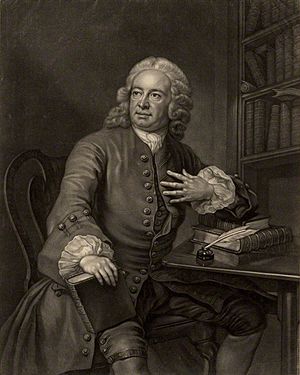Archibald Bower facts for kids
Quick facts for kids
Archibald Bower
|
|
|---|---|
 |
|
| Born | 17 January 1686 Dundee, Scotland
|
| Died | 3 September 1766 (aged 80) |
| Nationality | Scottish |
| Occupation | historian |
| Organization | Jesuit |
|
Notable work
|
History of Rome (1735–44), History of the Popes (1748–66) |
Archibald Bower (born 17 January 1686 – died 3 September 1766) was a Scottish historian. He is known for changing his religious beliefs several times during his life. People at the time found his explanations for these changes hard to believe.
Bower studied at the Scots College, Douai and later became a Jesuit in Rome. After moving to London in 1726, he joined the Church of England. He wrote a long book called History of the Popes, which came out in seven volumes between 1748 and 1766. This book caused some arguments because of his changing religious views. By the end of his life, it seemed he had switched religions three times.
Contents
Life
Early Years
Archibald Bower was born on January 17, 1686, near Dundee, Scotland. When he was 16, in 1702, he went to study at the Scots College, Douai. Later, he moved to Rome.
In Rome, he joined the Society of Jesus, also known as the Jesuits, in 1706. For several years, he taught classic subjects in different Italian cities like Fano and Fermo. He also studied theology in Rome.
From 1721 to 1726, he taught philosophy in places like Arezzo, Florence, and Macerata. He was a respected member of the Jesuit order during this time.
Moving to England
In 1726, Bower left Italy and moved to England. He arrived in London in the summer of that year. Here, he met people like Edward Aspinwall and Samuel Clarke.
After these meetings, Bower decided to leave the Roman Catholic Church and the Jesuit order. He stated that he was a Protestant for six years before officially joining the Church of England.
Through a doctor named Thomas Goodman, Bower found work as a tutor. He taught the son of Lord Aylmer, a nobleman. This job helped him meet important people, including George Lyttelton, who became a good friend.
In 1744, Bower briefly returned to the Catholic Church. However, he soon became unhappy again. By 1747, he had received back some money he had invested and once more moved away from the Catholic Church.
In 1748, Bower got a job as the keeper of Queen Caroline of Ansbach's library. This was thanks to his friend George Lyttelton. The next year, in 1749, he married a woman who was the niece of a bishop. She had her own money and a child from a previous marriage.
Later Life and Death
In 1754, George Lyttelton also appointed Bower as a clerk. This showed that he had important connections and was well-regarded by some powerful people.
Archibald Bower passed away on September 3, 1766. He was buried in the churchyard of St Marylebone Parish Church. His tombstone described him as a good person, honest, and a faithful friend. His wife confirmed that he died as a Protestant.
His Writings
Early Works
While living with Lord Aylmer, Bower wrote for a monthly magazine called Historia Literaria. This magazine was published from 1730 to 1734.
For the next nine years, from 1735 to 1744, he worked on a large project called the Universal History. He wrote the section about the history of Rome for this big book series. He was also paid to help revise a second edition of the work.
The History of the Popes
In 1747, Bower announced he would publish his most famous work, History of the Popes. He explained that his research, which was meant to support the Pope's power, actually made him change his mind.
He presented the first volume of his History of the Popes to the king in 1748. The second volume came out in 1751, and the third in 1753. This third volume covered history up to the death of Pope Stephen II in 757 AD.
Questions About His Work
In 1754, people started to criticize Bower's work. A pamphlet was published that questioned his book. This started a big public argument about Bower and his writings.
Some people, like Sir Henry Bedingfeld, claimed that letters written by Bower showed he was still a Catholic. Bower said these letters were fake. Another person, John Douglas, published pamphlets arguing that Bower's letters were real.
Douglas also suggested that parts of Bower's History of the Popes were copied from another historian's work. This made the controversy even bigger.
Despite these arguments, Bower continued to publish his work. He released his fourth volume and a shorter French version of his first four volumes. He also published the fifth volume of his history.
The final two volumes, the sixth and seventh, were published just before he died. However, the period from 1600 to 1758 was covered very quickly in only 26 pages. Later, his History of the Popes was reprinted with more information added by another author.
 | Janet Taylor Pickett |
 | Synthia Saint James |
 | Howardena Pindell |
 | Faith Ringgold |

